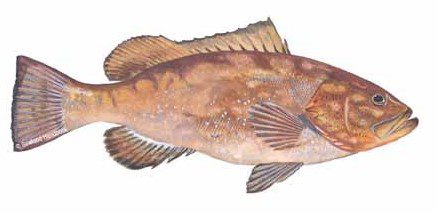

Grouper is a type of fish that can be safely fed to dogs in moderation. However, due to its mercury content and the risk of being contaminated with ciguatoxins, excessive consumption should be avoided. Eating too much grouper can lead to poisoning in dogs.
Grouper is packed with beneficial nutrients like omega-3 fatty acids which are good for the heart, and a variety of vitamins and minerals such as vitamin A, vitamin B9, calcium, magnesium, phosphorus, potassium, and selenium that are essential for a healthy canine functioning.
Grouper contains high levels of mercury and can potentially be contaminated by ciguatoxins which can cause diarrhoea, head shaking, vomiting, and paralysis if consumed in excessive amounts. Grouper bones are a choking hazard and can cause digestive tract injuries and impaction if ingested. Additionally, raw grouper may contain bacteria and parasites.
Grouper should only be given to dogs in moderation due to its mercury content and potential ciguatoxin contamination. If your dog has only had a small amount from your plate, and it has been properly cooked, it should be safe. It is not recommended to feed grouper to dogs as part of their regular diet.
Grouper is a type of fish that can be safely fed to dogs in moderation, but due to its high mercury content and potential risk for ciguatoxin contamination, it is important that dogs consume it only occasionally. This fish, which may also be known as anthias, badejo, garoupa, or kingfish, is found in tropical and subtropical waters. It is packed with beneficial nutrients like omega-3 fatty acids which are good for the heart, and a variety of vitamins and minerals like vitamin A and B9, as well as calcium, magnesium, phosphorus, and potassium which are essential for your pup’s health. However, the mercury and bacteria in raw grouper, as well as the choking hazard of bones, mean that it should only be given to your dog in very small amounts, and it should always be cooked before serving. Other alternatives to grouper for dogs are salmon and sardines, which are a less risky source of nutrients. People may wonder if it is affordable and easy to access grouper for their pet, or if they can add it to their dog’s regular diet - the answer is that it is not recommended to feed grouper to dogs as part of their regular diet. How has your pet enjoyed eating grouper in the past? Have you noticed any negative side-effects? Share your experiences in the comments below! We hope you and your pup enjoyed this article - if you are ever considering feeding fish to your dog, remember to give it to them only occasionally after properly cooking it to remove any bacteria or parasites. Have a great day with your furry friend!